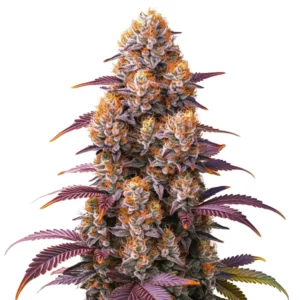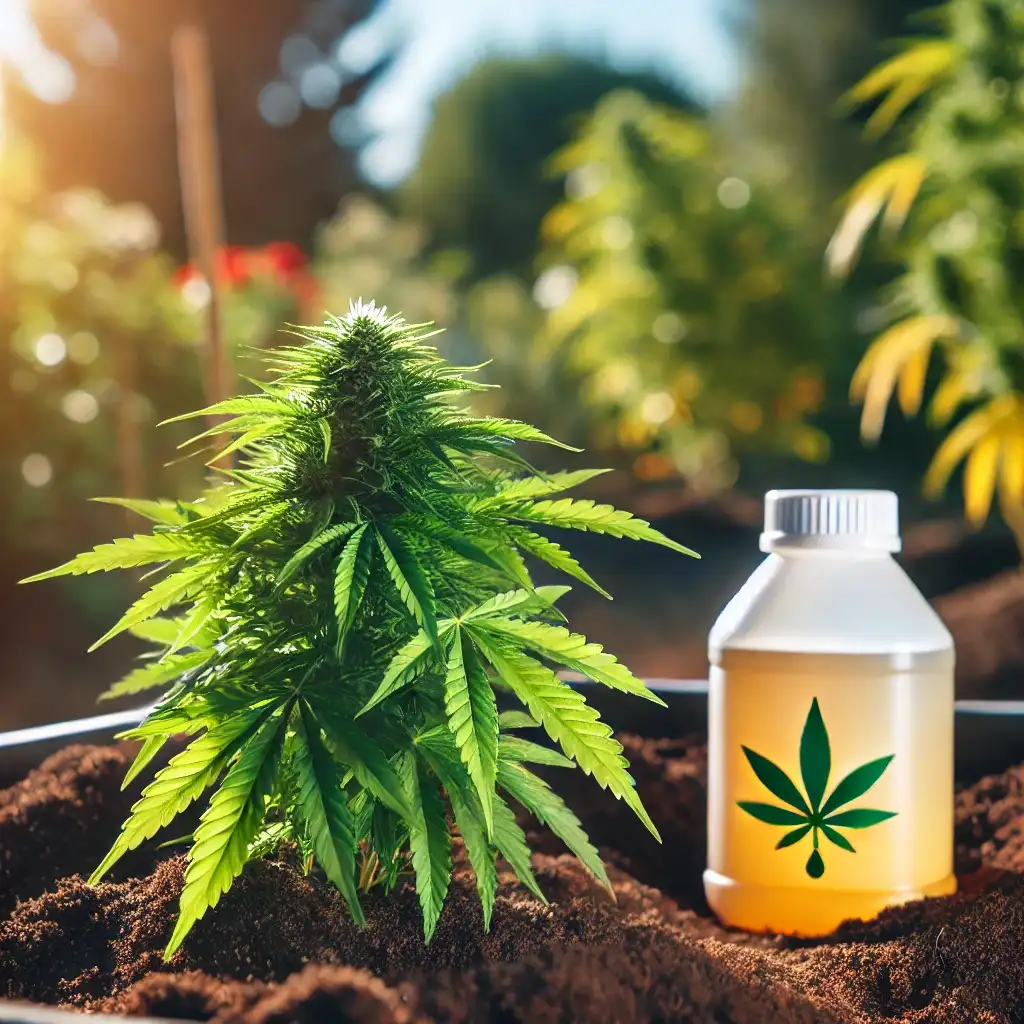
Use Urine for Nitrogen in Cannabis: A Sustainable Fertilization Option
Cannabis growers are always looking for cost-effective and sustainable ways to boost their plants’ health and productivity. One unconventional but surprisingly effective method is to use urine for nitrogen in cannabis. Urine is a natural source of nitrogen, a key nutrient that helps cannabis plants thrive, especially during the vegetative stage. In this article, we’ll explore whether using urine for nitrogen is safe, how it benefits cannabis growth, and the best practices for applying it to your plants.
Is It Safe to Use Urine for Nitrogen in Cannabis?
The idea of using urine to fertilize plants might seem strange at first, but it’s a common practice in many forms of organic gardening. Urine is packed with nitrogen, which is essential for healthy leaf growth. However, when it comes to cannabis, there are some important safety considerations to keep in mind.
Recommended Strains
Mazar
|
|
THC | 20% (Medium) |
|
|
Type | Feminized |
|
|
Yield | Medium |
|
|
Phenotype | 90% Indica / 10% Sativa |
Mazar Auto
|
|
THC | 8% - 10% (Low) |
|
|
Type | Autoflowering |
|
|
Yield | Medium |
|
|
Phenotype | 65% Indica / 35% Sativa |
The Nutrient Content of Urine
Human urine contains approximately 95% water and 5% organic and inorganic compounds, including nitrogen, phosphorus, and potassium. In fact, about 2.5-3.5 grams of nitrogen can be found in one liter of urine, which is more than enough to give cannabis plants the nitrogen boost they need.
When diluted properly, urine can be a fast-acting and effective fertilizer, delivering nitrogen directly to the plant’s roots. For those looking to use urine for nitrogen in cannabis, understanding its composition is essential. While nitrogen is the key nutrient in urine, it’s important to remember that urine also contains small amounts of salts and other compounds that need to be managed carefully.
Potential Risks of Using Urine on Cannabis Plants
Although urine is a powerful nitrogen source, there are risks involved if it’s not used correctly. Undiluted urine is too concentrated and can lead to nutrient burn, damaging the roots and leaves of your cannabis plants. It’s crucial to dilute urine with water to reduce its strength before applying it to your plants.
Additionally, there’s the issue of hygiene. Fresh urine is sterile, but if it’s stored for too long, bacteria can grow, which could introduce harmful pathogens into your grow space. Always use fresh urine and dilute it immediately to avoid these issues. With proper care, you can use urine for nitrogen in cannabis safely and effectively.
Promos & Deals
Benefits of Using Urine as a Nitrogen Source for Cannabis
Using urine as a nitrogen source offers several benefits for cannabis growers. From rapid nutrient absorption to cost savings, it’s an option worth considering for those looking for sustainable fertilization methods.
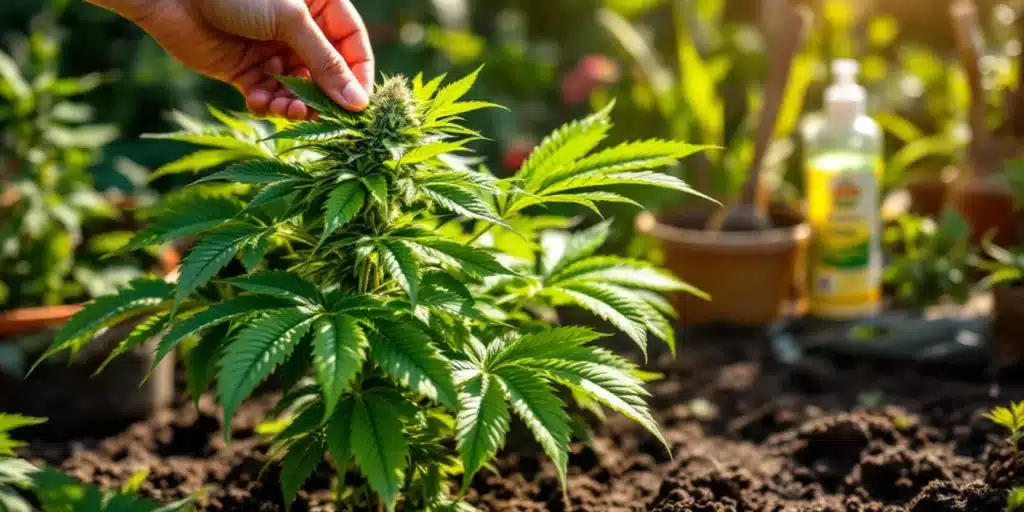
How Urine Provides Fast-Acting Nitrogen
One of the biggest advantages of using urine for nitrogen is how quickly it acts. Since urine is in liquid form, it’s easily absorbed by the soil, delivering nitrogen directly to the roots where it’s needed most. This can help correct nitrogen deficiencies faster than many commercial fertilizers, making it an ideal option for growers who need immediate results.
When you use urine for nitrogen in cannabis, you’ll notice that your plants respond quickly, often showing greener, more vigorous growth within a few days of application. This makes it a great option for growers who need a fast nitrogen boost during the vegetative stage.
Cost-Effective and Sustainable Fertilization
Another major benefit of using urine is its cost-effectiveness. Unlike store-bought fertilizers, urine is completely free and always available. For growers on a budget, this makes it a highly attractive option for nitrogen supplementation.
In addition to being cost-effective, using urine as a fertilizer is environmentally friendly. It reduces the need for synthetic fertilizers, which can have negative impacts on the environment when overused. By using a natural resource like urine, you can reduce waste and promote sustainable growing practices.
How to Safely Apply Urine to Cannabis Plants
If you decide to use urine for nitrogen in cannabis, it’s crucial to apply it safely and effectively to avoid damaging your plants. Proper dilution and timing are key to ensuring your plants receive the right amount of nitrogen without any adverse effects.
Dilution Ratios for Urine Fertilizer
The most important rule when using urine as a fertilizer is to dilute it properly. Undiluted urine is too strong and can burn your plants’ roots and leaves. A common dilution ratio is 1 part urine to 10 parts water, though some growers prefer to dilute it even further, especially for younger plants.
Once diluted, apply the urine solution to the soil around your plants. Avoid getting it on the leaves, as this can cause leaf burn. For best results, water your plants with the urine solution during their regular watering schedule, ensuring they receive consistent nitrogen without being overfed.
Best Practices for Applying Urine During the Vegetative Stage
The vegetative stage is when cannabis plants need the most nitrogen, as they’re focused on growing leaves and stems. This is the ideal time to use urine for nitrogen in cannabis, as it will help support fast, healthy growth. Apply the diluted urine solution every 1-2 weeks during this stage, depending on how your plants are responding.
Monitor your plants closely for any signs of nutrient burn, such as yellowing or browning at the edges of the leaves. If this occurs, reduce the frequency of urine applications or further dilute the solution. With proper care, your plants will thrive on the natural nitrogen boost from urine.
When Should You Avoid Using Urine on Cannabis?
While urine can be an effective source of nitrogen, there are certain times when it’s best to avoid using it on your cannabis plants. Knowing when not to apply urine is just as important as understanding how to use it properly, as overuse can cause more harm than good.
Risks of Overusing Urine on Cannabis Plants
Overusing urine as a nitrogen source can lead to a variety of problems for your cannabis plants. One of the most common issues is nitrogen toxicity, which occurs when plants receive too much nitrogen. Symptoms of nitrogen toxicity include dark green leaves, clawing (when the leaf tips curl downward), and weak, brittle stems. This can stunt your plants’ growth and reduce their ability to produce quality buds.
In addition to nitrogen toxicity, excessive use of urine can lead to an accumulation of salts in the soil, which can harm your plants’ roots and disrupt nutrient absorption. For those looking to use urine for nitrogen in cannabis, it’s important to apply it sparingly and to always dilute it to avoid these issues.
Monitor your plants closely after each application, and if you notice any of the symptoms mentioned, stop using urine and flush the soil with plain water to wash away excess nitrogen and salts.
Why Urine Shouldn’t Be Used During the Flowering Stage
Another important consideration when using urine as a fertilizer is timing. While urine is highly beneficial during the vegetative stage, it should be avoided during the flowering stage. During this phase, cannabis plants need lower levels of nitrogen and higher levels of phosphorus and potassium to support bud development.
Using urine during the flowering stage can result in nitrogen toxicity, causing your plants to focus on vegetative growth rather than producing dense, potent buds. This can lead to smaller yields and lower-quality flowers.
For those wondering how to use urine for nitrogen in cannabis, it’s best to stop using it once your plants enter the flowering stage and switch to a bloom fertilizer that’s specifically designed to support flowering and bud production.
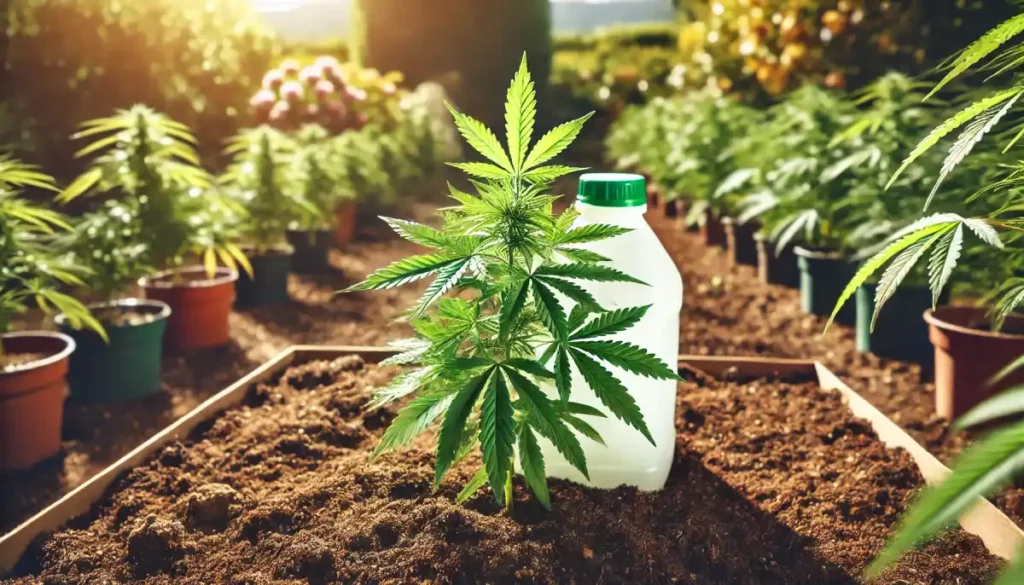
Alternatives to Urine for Organic Nitrogen Fertilization
If you’re looking for other organic ways to supplement nitrogen in your cannabis grow, there are several alternatives to using urine. These organic fertilizers provide a steady supply of nitrogen and can be used safely throughout the growing cycle.
Compost Tea and Other Organic Nitrogen Sources
Compost tea is one of the most popular organic fertilizers among cannabis growers. Made by steeping compost in water, compost tea is rich in beneficial microbes and nutrients, including nitrogen. It’s a great alternative to using urine, as it not only provides nitrogen but also improves soil health by boosting microbial activity.
Other organic nitrogen sources include blood meal, fish emulsion, and alfalfa meal. These fertilizers release nitrogen slowly over time, ensuring your plants receive a steady supply of nutrients without the risks associated with over-fertilization. If you’re hesitant to use urine for nitrogen in cannabis, these organic alternatives offer a more traditional approach to fertilization.
Comparing Urine with Commercial Organic Fertilizers
When comparing urine to commercial organic fertilizers, both options have their pros and cons. Urine is free, readily available, and fast-acting, making it a convenient option for growers on a budget. However, it requires careful dilution and application to avoid nutrient burn and over-fertilization.
Commercial organic fertilizers, on the other hand, are specifically formulated to provide balanced nutrition to cannabis plants. They’re easier to apply and come with clear instructions, reducing the risk of nutrient imbalances. However, they can be more expensive than using urine, which makes them less appealing to budget-conscious growers.
For those seeking a balance between cost-effectiveness and ease of use, rotating between urine and commercial organic fertilizers can be an effective strategy. You can use urine for nitrogen in cannabis during the vegetative stage, then switch to an organic bloom fertilizer during the flowering stage for optimal results.
How to Monitor and Adjust Nitrogen Levels When Using Urine
One of the keys to successfully using urine as a nitrogen source for cannabis is closely monitoring your plants to ensure they’re receiving the right amount of nutrients. By keeping an eye on your plants’ health, you can adjust your feeding routine to avoid over- or under-fertilizing them with urine.
Checking for Signs of Nitrogen Deficiency or Toxicity
When you use urine for nitrogen in cannabis, it’s important to regularly check for signs of nitrogen deficiency or toxicity. Nitrogen deficiency typically shows up as yellowing leaves, starting from the lower, older leaves and working its way up. If your plants are showing these symptoms, it means they need more nitrogen, and applying a diluted urine solution can help correct the issue.
On the other hand, nitrogen toxicity occurs when your plants receive too much nitrogen. As mentioned earlier, signs of toxicity include dark green leaves, clawing, and stunted growth. If you notice these symptoms, stop applying urine immediately and flush your plants with plain water to remove any excess nitrogen from the soil.
By monitoring your plants for these signs, you can make timely adjustments to ensure they stay healthy throughout the growing cycle.
Adjusting Your Dilution Ratios for Different Growth Stages
As your cannabis plants progress through different stages of growth, their nutrient requirements will change. During the vegetative stage, your plants need more nitrogen to support vigorous leaf and stem growth, making it the best time to use urine for nitrogen in cannabis.
However, as your plants enter the flowering stage, their nitrogen needs decrease, and they begin to require more phosphorus and potassium. To adjust for this, reduce the frequency and concentration of your urine applications during the later stages of vegetative growth and stop entirely once flowering begins.
To maintain the right balance of nutrients, consider using a bloom fertilizer once your plants start to flower, as this will provide the necessary nutrients for bud development without the risk of nitrogen toxicity.
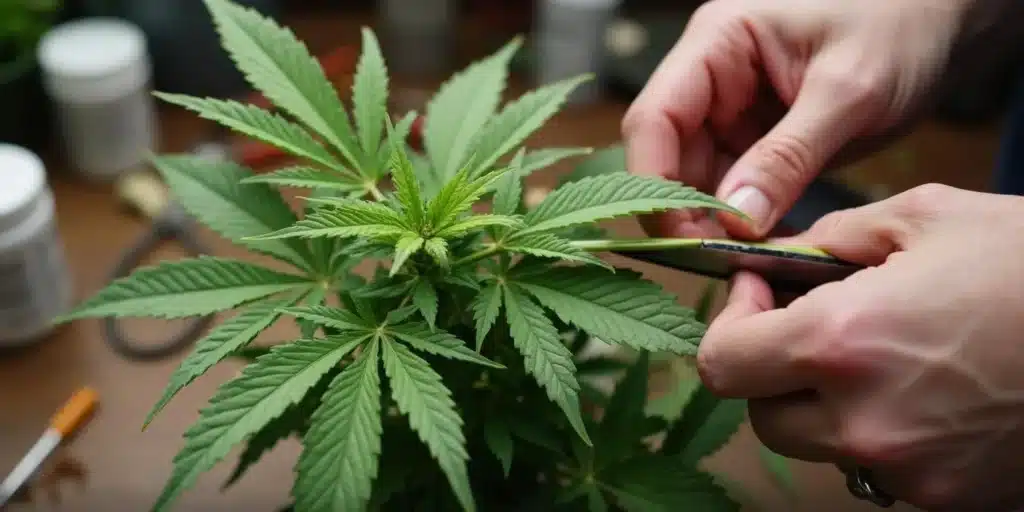
Addressing Concerns About Using Urine for Cannabis Growth
While the idea of using urine to fertilize cannabis plants might seem unconventional to some, it’s a highly effective and natural method for providing plants with essential nitrogen. However, there are common concerns among growers that need to be addressed.
Does Using Urine Affect the Taste or Quality of the Buds?
One of the most common concerns about using urine as a fertilizer is whether it will affect the taste, smell, or overall quality of the cannabis buds. The good news is that, when used properly and in the correct dilution ratios, urine should not have any negative impact on the final product.
Because urine is applied during the vegetative stage, when plants are focused on growing leaves and stems, it doesn’t interfere with bud development or terpene production. As long as you stop using urine before the flowering stage and switch to a bloom fertilizer, your plants will produce high-quality buds with no unpleasant aftertaste or odor.
For those looking to use urine for nitrogen in cannabis, it’s essential to follow the correct application guidelines to ensure your plants grow healthy and potent without any negative effects on the final harvest.
Is Urine a Long-Term Solution for Cannabis Fertilization?
While urine can be an effective and sustainable nitrogen source, it’s best used as part of a broader fertilization strategy. Over time, relying solely on urine for nitrogen can lead to nutrient imbalances in the soil, as urine doesn’t provide all the necessary macronutrients and micronutrients your cannabis plants need.
For long-term success, consider rotating between urine and other organic fertilizers, such as compost tea or commercial organic products. This will ensure your plants receive a balanced diet of nutrients throughout their life cycle.
If you’re interested in a sustainable and cost-effective approach to fertilization, using urine for nitrogen in cannabis is a great starting point, but it should be combined with other fertilization methods for the best results.
FAQs About Using Urine for Nitrogen in Cannabis
Is it safe to use urine for fertilizing cannabis plants?
Yes, urine is safe to use as long as it’s properly diluted. Urine contains high levels of nitrogen, which is beneficial for cannabis during the vegetative stage. However, applying undiluted urine can burn the plant’s roots and leaves, so it’s essential to mix it with water before applying.
What is the correct dilution ratio for using urine as fertilizer?
A common dilution ratio is 1 part urine to 10 parts water. Some growers dilute it even more, especially for younger plants, to avoid over-fertilization.
Can urine cause nitrogen toxicity in cannabis plants?
Yes, overuse of urine can lead to nitrogen toxicity, which is characterized by dark green, clawed leaves and weak stems. To prevent this, monitor your plants closely, use proper dilution, and reduce application frequency if you notice any symptoms of toxicity.
Does using urine affect the taste or quality of cannabis buds?
When applied during the vegetative stage and stopped before the flowering stage, urine should not affect the taste, smell, or quality of the buds. It’s important to stop using urine before flowering and switch to a bloom fertilizer.
When should I stop using urine as fertilizer for cannabis?
You should stop using urine as a fertilizer once your plants enter the flowering stage. During this phase, cannabis plants need less nitrogen and more phosphorus and potassium, so it’s better to switch to a fertilizer designed for blooming.
Can I use urine on cannabis grown indoors?
Yes, you can use diluted urine on cannabis grown both indoors and outdoors. Just be sure to apply it directly to the soil and avoid getting it on the leaves to prevent nutrient burn.
Is there a risk of bacteria from using urine on cannabis plants?
Fresh urine is sterile, but if stored for too long, it can develop bacteria. Always use fresh urine and dilute it immediately before applying it to your plants to minimize the risk of introducing harmful pathogens.
How often should I apply urine as a fertilizer?
During the vegetative stage, you can apply a diluted urine solution once every 1-2 weeks, depending on your plants’ response. Always monitor your plants for signs of over-fertilization and adjust your application frequency as needed.
What are some alternatives to using urine for nitrogen in cannabis?
If you prefer not to use urine, there are several other organic nitrogen sources, such as compost tea, blood meal, and fish emulsion. These options provide a steady supply of nitrogen and are also effective for cannabis growth.
Can using urine help with nitrogen deficiency in cannabis plants?
Yes, urine is a fast-acting nitrogen source and can help correct nitrogen deficiencies in cannabis plants quickly. Symptoms of nitrogen deficiency include yellowing leaves and stunted growth, and applying diluted urine can help your plants recover.













